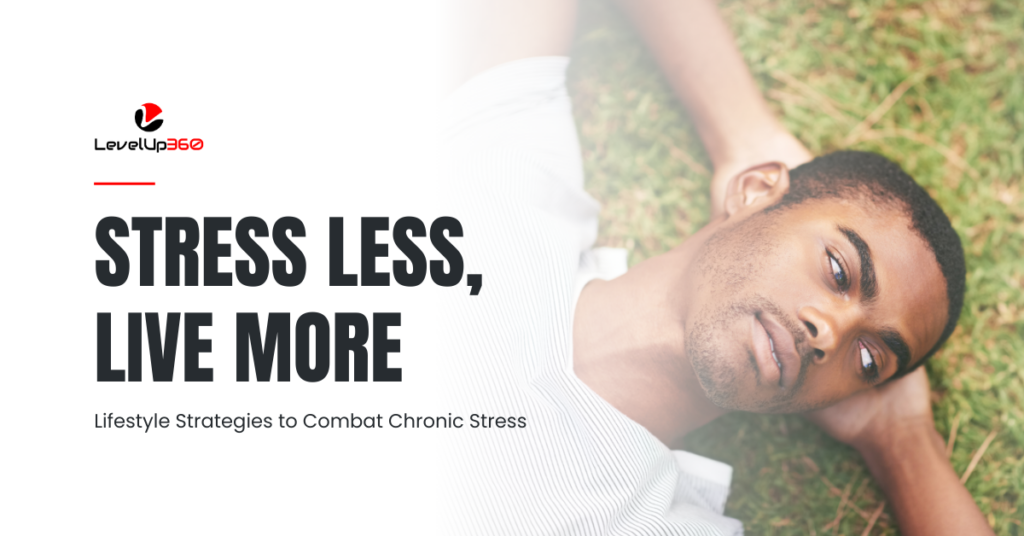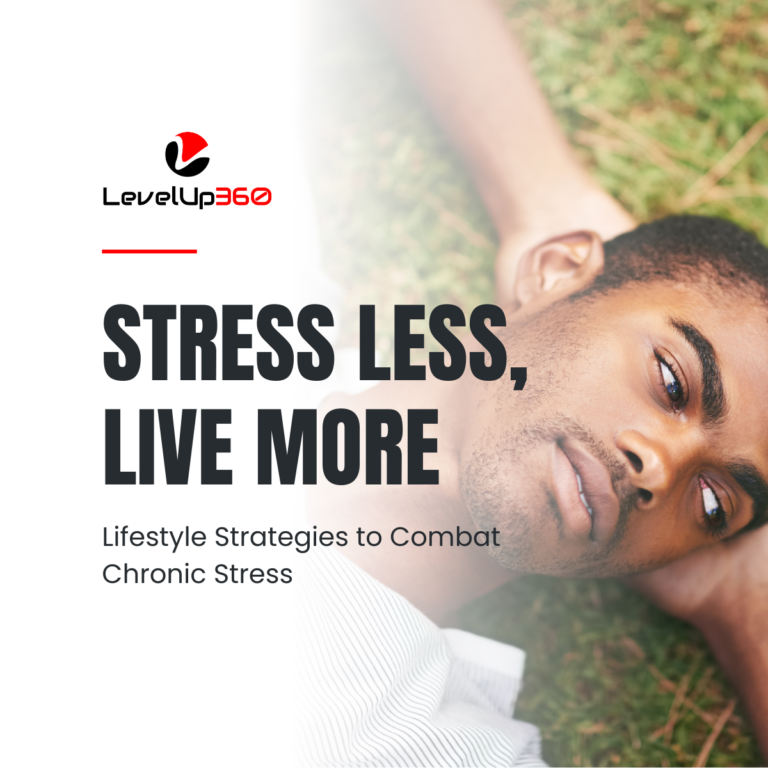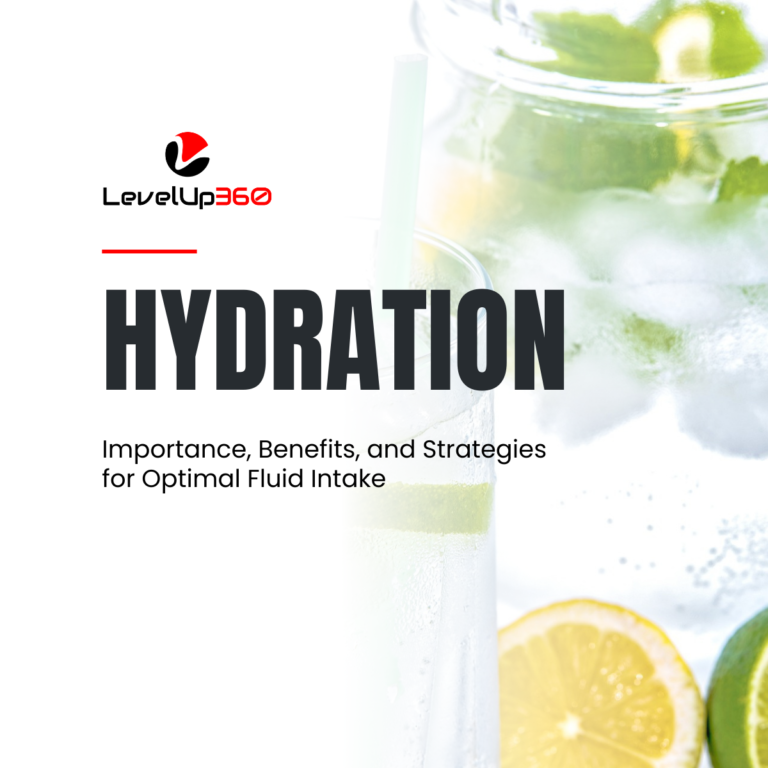
Stress Less, Live More: Lifestyle Strategies to Combat Chronic Stress
Feeling overwhelmed and exhausted from the mounting pressures of modern life? You’re far from alone. For countless over 40 today, chronic stress has become an inevitable shadow – constantly lurking in the background and silently draining mental and physical reserves.
If you’re aged 40 or older, you may be all too familiar with the burden of non-stop stress. And science now confirms what many have long suspected – prolonged periods of high stress can significantly jeopardise long-term health and well-being.
The daily grind is taking its toll. However, emerging research indicates there are natural ways to combat the insidious effects of chronic stress – beginning with lifestyle changes focused on nutrition, physical activity, and stress management techniques.
Consistent lifestyle self-care, including daily nourishment of your body and spirit, pays profound dividends across every dimension of your life.
The Broad Impacts of Unmanaged Stress
Before diving into the promising science of proactive stress management, it’s useful to understand precisely how chronic stress can undermine well-being as the years go by. Scientists are now unravelling the nuanced ways long-term activation of the body’s stress response system may contribute to concerning health issues.
For instance, a multitude of studies now link chronic stress to increased risks for:
- Obesity and weight gain
- Cardiovascular disease
- Hypertension
- Type 2 diabetes
- Clinical depression and anxiety
- Cognitive decline and impairment
- Sleep disturbances
- Accelerated biological ageing
The downstream effects of uncontrolled stress stretch far and wide, well beyond just feeling emotionally and physically drained day to day. These negative impacts appear most pronounced in adults over 45 – an age when other lifestyle factors like diet and exercise also often begin deteriorating.
Examining the Role of Cortisol
One of the key mechanisms underlying stress-related health declines is the dysregulation of the hormone cortisol. Cortisol is released by the adrenal glands as part of the body’s intrinsic “fight-or-flight” stress response.
In small, controlled bursts, cortisol helps regulate a diverse array of essential functions related to metabolism, blood sugar, immunity, motivation, and more. However, chronic, uncontrolled cortisol elevations can throw your physiology out of balance.
Cortisol normally follows a daily 24-hour circadian rhythm. Levels peak within the first hour of waking then gradually decline around midday and into the evening. However, this healthy cortisol curve can become blunted or flattened with age – especially when individuals are chronically stressed.
High evening cortisol levels, exaggerated morning spikes, and failure to shut off cortisol secretion at night are some hallmark signs of HPA axis dysfunction. This imbalance seems to not only result from but also exacerbate the perception of stress, creating a vicious cycle.
While more research is still emerging, scientists believe years of cortisol dysregulation may contribute to various health risks through the following mechanisms:
- Promoting visceral fat accumulation in the abdomen
- Altering brain structure and function in key regions
- Inhibiting insulin secretion and sensitivity
- Suppressing inflammatory and immune responses
- Impairing sleep cycles and depth
- Influencing mood-regulating neurotransmitters
In essence, prolonged stress appears to disrupt homeostasis across your interconnected physiological systems. Finding ways to mitigate stress and promote healthy cortisol secretion again becomes imperative for your long-term well-being.
Can Lifestyle Changes Influence Cortisol Levels and Stress Resilience?

While strong social support, professional mental health resources, and other strategies are invaluable for managing life’s demands, intriguing new research shows daily lifestyle habits may also beneficially influence stress physiology.
Several recent intervention studies have explored the potential stress-reducing effects of basic diet, exercise, and mind-body practices in midlife and older adults.
For instance, a 2021 study published in the International Journal of Behavioural Medicine examined how 4-month telephone-based health behaviour change programs impacted perceived stress and cortisol levels in chronically stressed adults over 45 years old.
Nearly 50 men and women were randomly assigned to one of four interventions:
- Stress management education and training
- Nutrition education and goal-setting
- Physical activity tracking and goals
- Combined exercise plus nutrition
Participants received phone coaching every 2 weeks on skills like relaxation techniques, healthy meal planning, activity monitoring, or both diet and exercise support depending on their assigned group.
Before and after the 4-month interventions, participants provided saliva samples on 2 consecutive days to assess cortisol awakening response, evening levels, and diurnal slope. They also completed validated scales measuring perceived stress, anxiety and depression.
So what changes occurred after 4 months of basic lifestyle interventions via phone? Encouragingly, substantial improvements emerged:
- Stress management education appears to have had the most direct impact on cortisol regulation based on salivary data. This group showed the greatest reductions in overall daily cortisol output as well as cortisol awakening spikes.
- Physical activity tracking did not significantly alter cortisol metrics. However, this intervention resulted in the largest decrease in perceived stress and depressive symptoms.
- Nutrition education and support yielded notable improvements in anxiety levels and the diurnal cortisol slope, indicative of healthier overnight recovery.
While conclusions cannot be drawn yet on optimal interventions, these initial findings help substantiate that even simple remote lifestyle coaching can impart meaningful benefits for both subjective well-being and underlying biology.
What might explain the stress-buffering effects observed from basic lifestyle changes like mind-body practices, activity tracking and healthy eating? Several key mechanisms are likely at play:
- Exercise: Has been found to increase the uptake of cortisol in skeletal muscle tissue, potentially lowering overall circulating levels. Physical movement also stimulates the release of endorphins and mood-lifting neurotransmitters like serotonin.
- Nutrition: Diets higher in anti-inflammatory compounds may help counter excessive inflammatory immune responses driven by cortisol. Whole, unprocessed foods also provide key micronutrients to strengthen the body’s stress resilience.
- Stress reduction techniques: Activate the parasympathetic nervous system to initiate relaxation and recovery. This may help rebalance dysregulated feedback loops in the HPA axis governing cortisol secretion.
The takeaway is that while behaviour-based interventions may not eliminate stressors themselves, they appear to strengthen the body’s capacity to adapt and bounce back from them. Boosting mental and physical fortitude through lifestyle is key.
Specific Stress Management Techniques and Habits Worth Cultivating
The emerging research reveals great promise for practical lifestyle approaches as a first line of defence against the ravages of chronic stress. While medication has its place in extreme presentations, dietary choices, daily movement, sleep and relaxation skills should be the foundation.
Science substantiates the benefits of these positive health habits for both cognitive and emotional well-being as well as underlying physiology. Those able to make them a lasting part of their routine reap profound advantages.
Here are some healthy stress management habits backed by research:
Incorporate Stress-Relieving Activities Daily
- Mindfulness practices– Yoga, meditation, breathwork. 10-20 min daily.
- Progressive muscle relaxation– Tense and release muscle groups systematically. 10 min daily.
- Guided imagery– Visualise calming scenes or memories. 10 min daily.
- Nature time– Forest bathing, beach walks, hiking. Weekly.
- Socialising– Meet friends regularly for healthy social connections. Weekly.
Optimise Nutrition and Hydration
- Anti-inflammatory diet– Colourful produce, healthy fats, lean proteins, whole grains.
- Balanced meals and snacks– Don’t skip meals. Stabilise blood sugar.
- Adequate hydration– Sip water regularly throughout the day.
- Limit alcohol– Disrupts sleep and stress response.
- Limit caffeine– Causes jitters and insomnia if overdone.
Cultivate More Active Lifestyle Habits
- Regular exercise– Fitness provides mental and physical rejuvenation. 30-60 min daily if possible.
- Movement breaks– Take short walks, and stretch breaks every 1-2 hours during long sedentary periods.
- Ergonomic spaces– Set up workspace and home to encourage movement and good posture.
Optimise Sleep Habits
- Wind down pre-bed– Unplug from screens an hour before bedtime. Read or meditate.
- Cool, dark room– Keep bedroom temperatures around 16-20°C. Block out light.
- Schedule time– Allow for 7-9 hours in bed. Go to bed and wake up at consistent times, even at weekends.
- Limit naps– While short power naps can help, long daytime naps interfere with night time sleep.
Adopting Realistic, Maintainable Changes Over Time
Of course, cultivating healthy habits is far easier said than done, especially when you’re already depleted and leading a stressful existence. The key is to take small, gradual steps that feel manageable rather than forcing rigid overnight transformations.
Consider starting with just 1-2 lifestyle changes from the lists above that seem the most appealing and sustainable. Get in the rhythm of those, then build momentum by adding another when the first new habits feel solidly established after a few weeks.
Patience and self-compassion are essential – this is a lifestyle change, not a quick fix. There will inevitably be setbacks where old patterns creep back in. Expect this in advance and respond with positive self-talk rather than criticism. Each day is a chance to start fresh.
Look for small ways to integrate stress management and well-being practices seamlessly into your normal daily flow. The ultimate goal is for enhanced self-care and fun movement to feel like rewarding rituals you genuinely enjoy, not additional burdens.
When caring for your body and mind becomes a natural part of everyday life rather than a chore, you build lasting resilience to handle whatever comes your way. The research confirms what you likely know intuitively – consistent lifestyle self-care pays dividends across every dimension of your life.
A Proactive Approach for Boosting Long-Term Wellbeing
Left unchecked, the creeping effects of chronic stress and cortisol dysregulation can eventually overtake health and derail quality of life. But with focused lifestyle changes, you can proactively strengthen your body’s stress response system as the years go by.
As the latest scientific findings reveal, simple sustained improvements in your daily nutrition, exercise and relaxation habits may buffer the impacts of stress at the deepest physiological level. Regular self-care primes you to roll with the punches life brings rather than become overwhelmed.
While surrounding yourself with positive social support and seeking professional assistance when needed are also invaluable, never underestimate the profound benefits of a healthy lifestyle. Your daily habits form the frontline defence against stress.
The great news is, that even in the face of ongoing demands, you have the power to construct a new outlook and approach to thriving in midlife and beyond. By consistently making time for self-care based on realistic goals, you anchor yourself in resilience and purposeful contentment.
Rather than a passive casualty of chronic stress, intentionally choose activities and rituals that recharge you mentally and physically. The science confirms what you likely know deep down – taking time to nourish your body and spirit each day benefits every dimension of your life profoundly.
Lasting change happens gradually, one small step at a time. Progress over perfection is the mantra. Keep showing up for yourself with patience and compassion.
Recommended reading
- 1
- 2
Recommended reading
Additional Resources
Feeling in control of your health
If you are interested in improving your health and wellness, check out other resources such as Our Blog, Free Resources and/or join our private Body-Mind Transformation Secrets Community on Facebook, and go on an even deeper dive with me to uncover how to succeed in your health and wellness goals.
You may also be interested in our Sleep Secrets Cheat Sheet. It is a great resource with strategies to fix and optimize your sleep which is crucial to succeeding in your health and wellness goals.
Resources
Pictures
Canva.com and Freepik.com by Wayhomestudio








